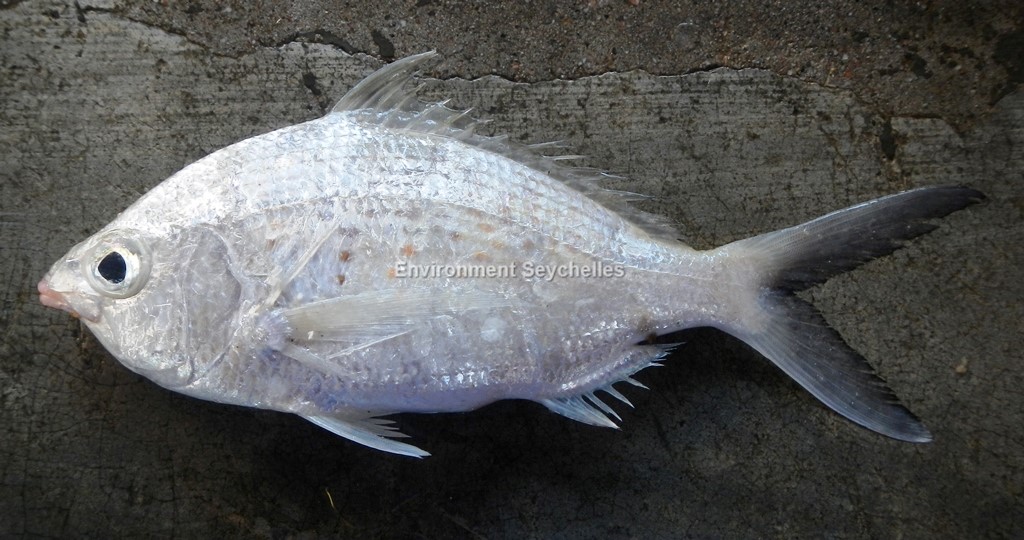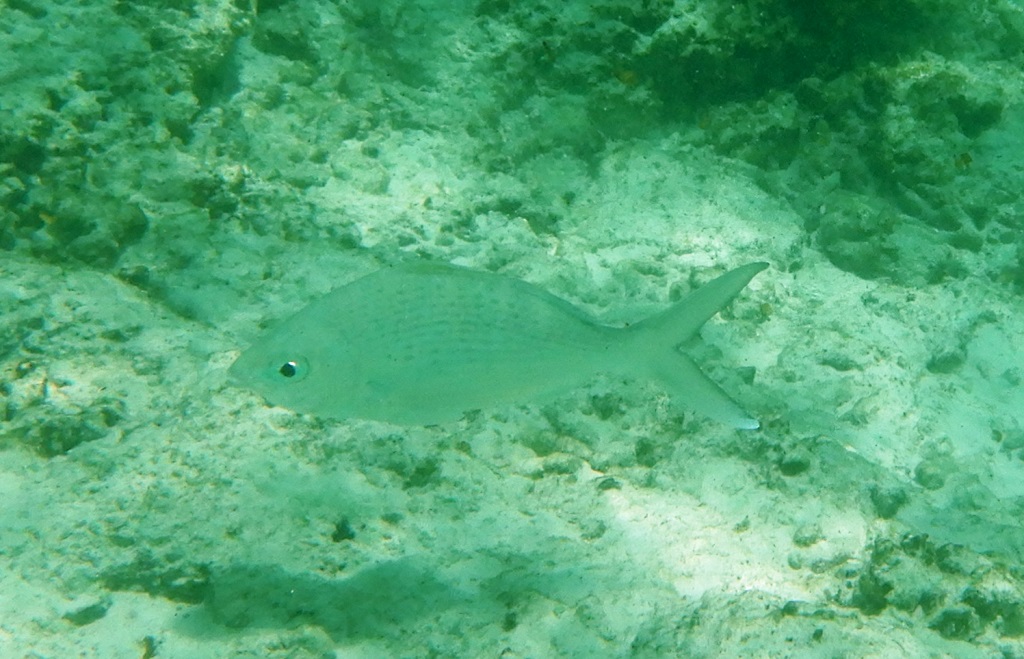Description:
Dorsal spines: 9; Dorsal rays: 10; Anal spines: 3; Anal rays: 7.
Full bodied Mojarra. Upper jaw extending vertically beyond anteriormost margin of eye, sometimes reaching to vertical at anterior margin of pupil. Second dorsal fin spine
longest. Pectoral fins reaches to or beyond level of anal fin origin. Caudal fin forked deeply.
Colour. Body greyish-white above becoming silvery below with prominent dark stripes along scale rows above lateral line in living specimens. 4-9 somewhat oblique dusky bars
or columns of ovoid dark spots immediately below lateral line in specimens over 10 cm SL (dusky bars on less than 10 cm). Dorsal fin membrane with faint black blotches or
small spots at base of each spine and ray. Dorsal fin membrane silvery anteriorly on 1st-5th dorsal spine, grading to hyaline on spinous and soft dorsal fin. Anal fin scaly
basal sheath silver; pectoral and anal fins hyaline. Caudal fin dusky with broad darker margin posteriorly; ventral edge of lower caudal fin lobe white or bluish-white.
Size:
Maturity: Lm unknown. Range unknown. Max Length: 44.5 cm TL. Commonly 20cm TL.
Habitat and Ecology:
Often found in clear coastal waters (depth 0-50m) with a preference for shallow waters over sandy substrates. Juveniles are often observed in estuaries or lagoons influenced
by freshwater. Occur singly or in groups. Feed on small benthic invertebrates.
Females tend to grow significantly faster than males and achieve greater overall sizes than males. The mean size at first sexual maturity is 16.3 cm for males and 20.6 cm
for females.
Fishery Status:
This species is not protected or subject to fishery regulations. It is caught in the net fishery, and is occasionally caught in quite large numbers.
Notes:
Gerres longirostris differs from G. oblongus in having a deeper body (mean 39% SL vs mean 33% SL in G. oblongus), fewer pored lateral line scales (43±46 vs 45±49), and a
broad dark caudal on posterior margin.
References:
Froese, R. & D. Pauly. (Eds.) (2020). FishBase. Gerres longirostris https://www.fishbase.se/summary/Gerres-longirostris.html (04/04/20).
Iwatsuki, Y. et al. (2001). Redescription of Gerres longirostris (LacepeÁde, 1801) and Gerres oblongus Cuvier in Cuvier and Valenciennes, 1830, Included in the Gerres
longirostris Complex (Perciformes: Gerreidae). Copeia, 2001(4), pp. 954-965.
Munroe, T.A. et al. (2016). Gerres longirostris (errata version 2017). The IUCN Red List 2016: https://dx.doi.org/10.2305/IUCN.UK.2016-1.RLTS.T46081926A46664539.en. (04/04/20).
Citation:
Nevill, J.E.G. (2020). Gerres longirostris, Strongspine silver-biddy. Seychelles Seatizens. www.seatizens.sc. https://seatizens.sc/species/gerres-longirostris-lacepede-1801/ (edited 03/07/22).



pin-up 306 https://azerbaijancuisine.com/# pin up
pin-up kazino
mexican drugstore online: mexican pharmacy online – mexico pharmacies prescription drugs
https://northern-doctors.org/# medicine in mexico pharmacies
mexican pharmaceuticals online mexican northern doctors mexico drug stores pharmacies
best online pharmacies in mexico: northern doctors pharmacy – п»їbest mexican online pharmacies
https://northern-doctors.org/# mexico drug stores pharmacies
https://northern-doctors.org/# mexican mail order pharmacies
mexican border pharmacies shipping to usa: mexican pharmacy – mexico pharmacy
medication from mexico pharmacy mexican pharmacy northern doctors purple pharmacy mexico price list
http://northern-doctors.org/# best online pharmacies in mexico
https://northern-doctors.org/# best online pharmacies in mexico
Fantastic insights! Your perspective is very refreshing. For more details on this topic, visit: EXPLORE FURTHER. What do others think?
mexico drug stores pharmacies buying prescription drugs in mexico online п»їbest mexican online pharmacies
https://northern-doctors.org/# mexican drugstore online
https://northern-doctors.org/# mexican pharmaceuticals online
https://northern-doctors.org/# mexican mail order pharmacies
https://northern-doctors.org/# medicine in mexico pharmacies
pharmacies in mexico that ship to usa mexican pharmacy northern doctors mexican online pharmacies prescription drugs
https://northern-doctors.org/# medication from mexico pharmacy
mexican mail order pharmacies: medicine in mexico pharmacies – mexican pharmacy
https://northern-doctors.org/# medication from mexico pharmacy
https://northern-doctors.org/# mexican border pharmacies shipping to usa
buying prescription drugs in mexico online mexican pharmacy mexico drug stores pharmacies
https://northern-doctors.org/# mexican drugstore online
top online pharmacy india: top 10 pharmacies in india – top 10 online pharmacy in india
http://canadapharmast.com/# my canadian pharmacy rx
top 10 online pharmacy in india indian pharmacies safe reputable indian online pharmacy
buy medicines online in india: buy prescription drugs from india – Online medicine order
canadian pharmacy phone number global pharmacy canada canadian pharmacy ltd
http://foruspharma.com/# purple pharmacy mexico price list
canada discount pharmacy: canadian pharmacy drugs online – canadian pharmacy oxycodone
canadian pharmacies comparison best canadian pharmacy online buy drugs from canada
mexican pharmaceuticals online: mexico drug stores pharmacies – mexican mail order pharmacies
https://indiapharmast.com/# best india pharmacy
Online medicine order: indian pharmacies safe – mail order pharmacy india
buy medicines online in india: buy prescription drugs from india – india online pharmacy
https://paxloviddelivery.pro/# paxlovid covid
amoxicillin 500 mg online: antibiotic amoxicillin – buy amoxicillin online no prescription
can i order generic clomid without insurance: buying clomid tablets – where can i buy clomid without insurance
buy cipro without rx: buy cipro online – cipro pharmacy
http://paxloviddelivery.pro/# Paxlovid over the counter
https://amoxildelivery.pro/# amoxicillin capsule 500mg price
buy cipro online without prescription: ciprofloxacin generic price – buy cipro without rx
can i purchase generic clomid without dr prescription: can i buy clomid without rx – can you get clomid
Paxlovid over the counter: п»їpaxlovid – Paxlovid buy online
where to buy amoxicillin over the counter: buy amoxicillin without prescription – where to buy amoxicillin over the counter